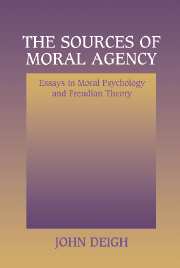Book contents
- Frontmatter
- Contents
- Preface
- Sources
- Abbreviations
- Dedication
- 1 Morality and personal relations
- 2 On the right to be punished: Some doubts
- 3 Love, guilt, and the sense of justice
- 4 Remarks on some difficulties in Freud's theory of moral development
- 5 Freud's later theory of civilization: Changes and implications
- 6 Freud, naturalism, and modern moral philosophy
- 7 Reason and motivation
- 8 Empathy and universalizability
- 9 Sidgwick on ethical judgment
- 10 Reason and ethics in Hobbes's Leviathan
- 11 Shame and self-esteem: A critique
- Index
2 - On the right to be punished: Some doubts
Published online by Cambridge University Press: 04 December 2009
- Frontmatter
- Contents
- Preface
- Sources
- Abbreviations
- Dedication
- 1 Morality and personal relations
- 2 On the right to be punished: Some doubts
- 3 Love, guilt, and the sense of justice
- 4 Remarks on some difficulties in Freud's theory of moral development
- 5 Freud's later theory of civilization: Changes and implications
- 6 Freud, naturalism, and modern moral philosophy
- 7 Reason and motivation
- 8 Empathy and universalizability
- 9 Sidgwick on ethical judgment
- 10 Reason and ethics in Hobbes's Leviathan
- 11 Shame and self-esteem: A critique
- Index
Summary
Some doctrines outlive the systems of philosophy that bear them. Such is the doctrine that a criminal has a right to be punished for his crime. Born of Hegelian social philosophy, it still finds adherents and sympathizers long after the death of its progenitor. The reason for its independent life is not hard to make out. The doctrine captures for many the uplifting thought that human society owes even its most inimical members respect as responsible, moral agents. Punishment is part of any institution of social control that treats persons as responsible, moral agents, and thus punishment becomes a sign of respect. To those attracted to moral theories whose shibboleth is respect for persons, the doctrine has immediate appeal.
At the same time, talk about a criminal's right to be punished is bound to perplex. What manner of right is this? A right to suffer the deprivation of some good or to be visited with some evil? What could ever possess a person to want to assert such a right? The perplexity that these questions engender thus checks any inclination to embrace the doctrine. Looked at in one way, the doctrine is appealing; looked at in another, it is a morass of confusion.
- Type
- Chapter
- Information
- The Sources of Moral AgencyEssays in Moral Psychology and Freudian Theory, pp. 18 - 38Publisher: Cambridge University PressPrint publication year: 1996



